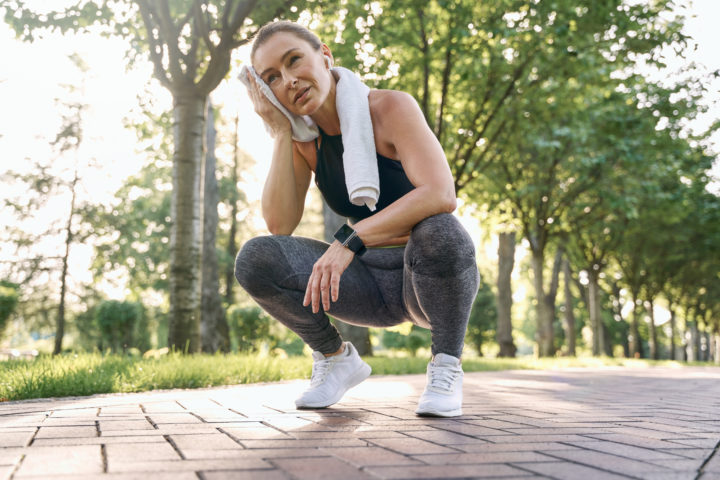Staying hydrated is essential for maintaining good health, especially if you want to take your fitness to the next level. Sometimes drinking plain water may not be enough to replenish lost fluids and electrolytes in our bodies. This is where pre-workout supplements step in, as they can help us achieve optimal hydration levels.
In this pre-workout world article, we explore some of the most effective ingredients that help us achieve optimal hydration and promote overall wellness. Let’s dive in!
SHORt SUMMARy
- Proper hydration is a simple and accessible method for achieving better health.
- Water intake is not always enough to keep us hydrated!
- Electrolytes and key vitamins can help you stay at optimal hydration
What is the Role of Hydration Supplements?
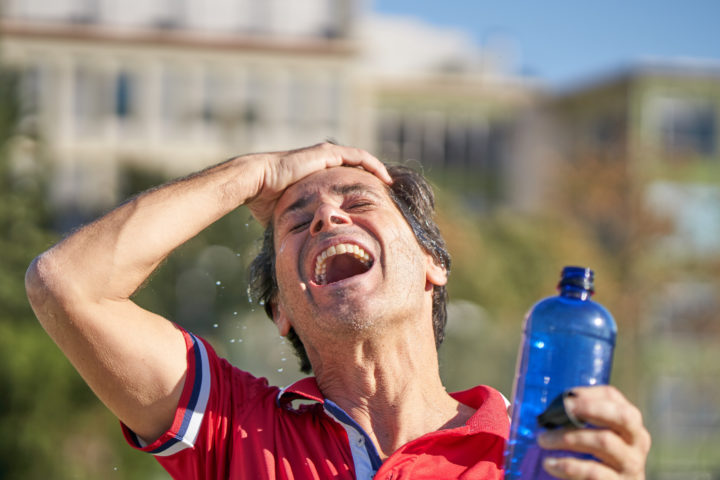
Keeping yourself properly hydrated is essential for maintaining good health, especially when you are physically active or exposed to hot weather conditions.
This is where hydration supplements come in handy! By providing you with the best supplement ingredients for hydration, these solutions offer building blocks and components packed with elements that can improve your hydration status effortlessly.
Scientifically proven and tested by experts, these hydration ingredients work systematically and quickly to ensure that you stay hydrated. But which supplement ingredients are the best for hydration? Let’s take a look.
Electrolytes: Essential Hydration Ingredients
Electrolytes are necessary supplement ingredients and play a crucial function in hydration. These minerals, which include sodium, potassium, magnesium, and calcium, are in charge of preserving the body’s normal fluid equilibrium.
Electrolytes are lost through sweating when we exercise vigorously or perspire heavily. Restoring the body’s fluid and electrolyte balance and ensuring proper hydration depend on replenishing electrolytes. People can efficiently rehydrate and boost their general performance and wellbeing by incorporating electrolytes in their supplement regimen.
KEY POINT
These minerals aid in the body’s ability to absorb and retain fluids, reducing dehydration and fostering appropriate physiological processes.
How Does Electrolyte Balance Improve Hydration and Health?
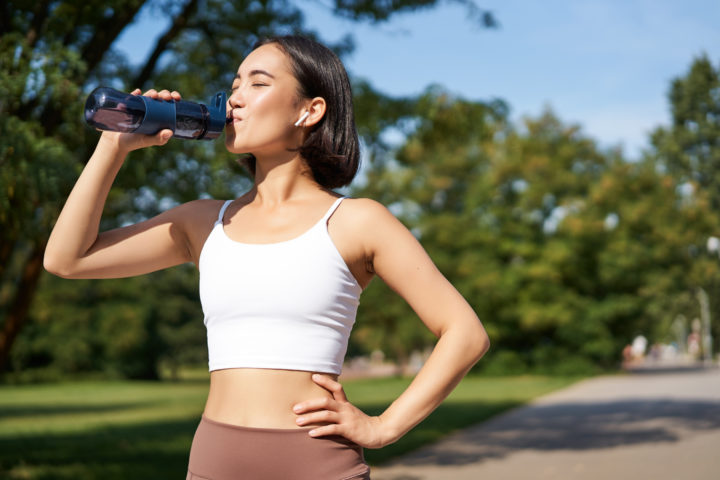
Maintaining a proper electrolyte balance is key to fitness and overall health for several important reasons:
1. Fluid Balance
Electrolytes, including sodium and potassium, are essential for maintaining the body’s fluid equilibrium. They aid in ensuring that there is the appropriate quantity of water both within and outside of the body’s cells. For optimum cellular function, including the transportation of nutrients, the elimination of waste, and general cellular hydration, this equilibrium is essential.
2. Muscle Function
Electrolytes are necessary for healthy muscular performance. They aid in facilitating nerve impulses and muscular contractions, enabling muscles to contract and relax efficiently during activity. Electrolyte imbalances may impair performance and recovery by causing muscular cramps, tiredness, and weakness.
3. Cellular Hydration
Electrolytes, in particular sodium, assist in controlling the body’s absorption and retention of water. They are essential for keeping hydrated because they encourage fluid absorption into cells and limit excessive water loss via urination. In order to maintain blood volume, control body temperature, and promote general physiological function, proper hydration is essential for exercise performance.
4. Energy Production
At the cellular level, electrolytes are involved in the creation of energy. They take part in the process of turning food into useable energy, which is necessary for maintaining physical activity and promoting healthy metabolic processes.
5. Nerve Function
Electrolytes play a crucial role in normal nerve function. They aid in the body’s electrical impulse transmission, enabling effective communication between the brain and muscles. Optimal nerve signaling, coordination, and response speed are supported by adequate electrolyte levels, which improve sports performance and general motor abilities.
KEY POINT
Electrolytes do more than aid in hydration and fluid balance. They play vital roles in numerous bodily functions, and so should always be kept in balance — even if you are not concerned about dehyration!
What are the Best Electrolytes for Hydration?
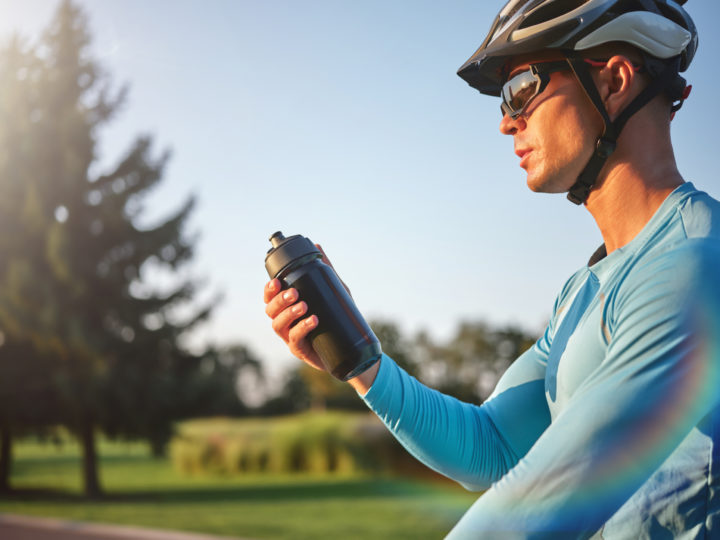
Not all electrolytes are created equal, especially when it comes to hydration. Each electrolytes functions differently and offers distinct benefits. So when choosing which hydration supplement ingredient to use, consider the benefits of each first.
Sodium
Sodium is one of the best supplement ingredients to keep your body in check with optimal fluid balance. Studies indicate that sodium helps regulate water absorption into cells and prevents excessive water loss through urine, ensuring speedy hydration. Its systematic role also supports muscle function, energy production, and nerve function, making it a crucial element in any hydration formula. Don’t underestimate the power of sodium for absolutely improving your hydration game!
Potassium
As one of the building blocks and components of hydration, potassium effortlessly improves your fluid balance and keeps your body in check. Scientifically tested and proven, this science-backed element works by regulating water absorption into cells and preventing excessive water loss through urine, meaning you’ll be fully hydrated within minutes! Plus, its systematic role supports muscle function, energy production, and nerve function, making it an absolutely crucial factor in any hydration formula or solution. So don’t underestimate the power of potassium; it’s packed with benefits that will improve your hydration game!
Magnesium
Magnesium is a beneficial supplement ingredient that is essential for enhancing hydration. It is a vital element that aids in the absorption and retention of water, promoting optimum fluid balance in the body. Magnesium also helps muscles relax, which lowers the chance of muscular cramps and improves general physical performance during exercise or intense tasks.
Calcium
Calcium is a vital supplement ingredient for maintaining proper hydration. It helps regulate electrolyte concentration in the body, ensuring optimal fluid balance. By supporting muscle function and preventing cramps, calcium also plays a crucial role in promoting hydration during physical activity. Including calcium as a supplement ingredient can help individuals stay hydrated and perform at their best.
Chloride
Chloride is an essential electrolyte that helps improve hydration in a snap! As one of the best supplement ingredients for hydration, it acts as a building block to keep your body feeling great. Chloride effortlessly regulates water absorption into cells and has been scientifically tested and proven to work within minutes. Experts and professionals agree that chloride is a systematic tool to stay properly hydrated, and its speedy benefits are packed with everything you need for optimal hydration. Don’t overlook this science-backed element when searching for solutions to stay healthy and hydrated; give chloride a try today!
Phosphorus
Phosphorus is one of the best components for improving hydration in your body. It works as a building block that effortlessly keeps you feeling great and hydrated. Like chloride, phosphorus has been scientifically tested and proven to work within minutes, making it an absolutely essential element for optimal hydration. Experts and professionals alike agree that incorporating phosphorus into your diet is a systematic tool for staying healthy and hydrated. With its speedy benefits packed into formulas and solutions, don’t overlook this science-backed nutrient! Give phosphorus a try today and experience its effortless benefits for yourself.
What are the Food Sources of Electrolytes?
You don’t always need to seek out hydration supplements to balance your electrolytes. As long as you are in good health and are overly active, you may find that a balanced diet does the trick for you. What foods have the highest electrolytes? Here are some healthy foods you can eat which contain each key electrolyte.
What are the Best Foods with Sodium?
- Sea salt
- Celery
- Olives
- Pickles
- Tomato sauce
What are the Best Foods with Potassium?
- Bananas
- Avocados
- Oranges
- Spinach
- Sweet potatoes
What are the Best Foods with Calcium?
- Dairy products (milk, yogurt, cheese)
- Leafy green vegetables (kale, collard greens, broccoli)
- Almonds
- Salmon
What are the Best Foods with Magnesium?
- Nuts and seeds (almonds, cashews, pumpkin seeds)
- Leafy green vegetables (spinach, Swiss chard)
- Legumes (black beans, chickpeas, and lentils)
- Whole grains (quinoa, brown rice, and oats)
What are the Best Foods with Chloride?
- Sea salt
- Celery
- Olives
- Seaweed
- Rye
What are the Best Foods with Phosphorus?
- Dairy products (milk, yogurt, cheese)
- Fish (salmon, tuna)
- Poultry (chicken, turkey)
- Legumes (beans, lentils)
- Nuts (almonds, peanuts)
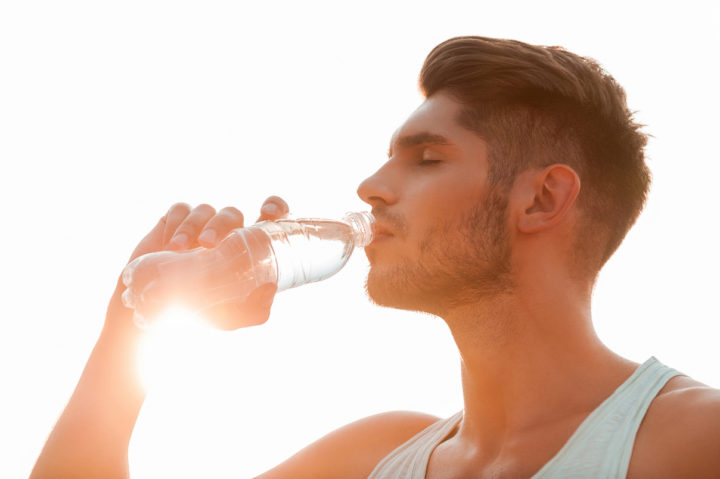
What Supplement Ingredients are Best for Hydration?
Electrolytes are not your only source of hydration support. Numerous vitamins and supplements will help you achieve optimal hydration and crush your fitness goals. But which vitamins and supplement ingredients should you consider? Let’s explore your options and the benefits of each.
What Key vitamins do you need for hydration?
Vitamin C
Vitamin C is essential for maintaining the health of the skin, blood vessels, and mucous membranes, all of which are important components of hydration. Collagen, a protein that gives the skin and blood vessels structure, is formed and maintained with its aid. Vitamin C supports healthy blood flow and nutrient delivery to the cells, including those in charge of maintaining hydration, by preserving the integrity of blood vessels. Vitamin C is also an antioxidant that helps stop the dehydration-causing effects of free radicals on cells.
Foods high in Vitamin C: Vitamin C-rich foods, like citrus fruits, berries, kiwis, and leafy greens, can aid in maintaining hydration.
B Vitamins
B-complex vitamins (B1, B2, B3, B6, and B12): The B-vitamins in the vitamin B complex, including thiamine (B1), riboflavin (B2), niacin (B3), pyridoxine (B6), and cobalamin (B12), are necessary for proper hydration and energy metabolism. These vitamins are essential for the body’s cellular processes and fluid balance because they help turn food into energy. They participate in the metabolism of proteins, carbohydrates, and fats, supplying the body’s cells with energy and assisting the body’s hydration systems.
Foods high in B Vitamins: Whole grains, legumes, nuts, seeds, lean meats, fish, and dairy items are among the foods high in B vitamins.
Vitamin E
A fat-soluble vitamin called vitamin E helps protect cell membranes from free radical damage by acting as an antioxidant. Vitamin E helps the skin stay healthy and promotes moisture retention when it comes to hydration. By preventing water loss through the skin barrier, it aids in preventing oxidative stress on the skin. Moreover, vitamin E promotes the overall health of blood vessels, ensuring effective nutrient absorption and waste elimination, which indirectly aids in proper hydration.
Foods high in Vitamin E: Nuts, seeds, vegetable oils, broccoli, spinach, and other cruciferous vegetables are good sources of vitamin E.
KEY POINT
While these vitamins promote hydration through a variety of mechanisms, it’s crucial to remember that getting enough water is the key to staying hydrated in general. To support general health and hydration levels, remember that these vitamins work in concert with appropriate hydration techniques.
Are Amino Acids Hydration SUpporting Ingredients?
The simple answer is yes, though the science behind the answer is a bit complex. So let’s simplify it. When discussing the hydration support of amino acids, there are really only two to talk about.
L-Glutamine
L-Glutamine is an amino acid that plays a vital role in maintaining hydration and supporting overall health. It is the most abundant amino acid in the body and is involved in various cellular processes, including protein synthesis and immune function.
When it comes to hydration, L-Glutamine helps maintain the balance of fluid within cells by promoting water uptake. It aids in the regulation of osmotic pressure, which ensures that cells retain the appropriate amount of water. This amino acid is especially important for the health of cells in the gastrointestinal tract, as it supports their hydration and integrity.
Good food sources of L-Glutamine: meat, fish, dairy products, legumes, and certain fruits and vegetables.
L-Carnitine
L-Carnitine is an amino acid-like compound that plays a crucial role in energy production and metabolism. While it may not directly impact hydration levels, it indirectly supports hydration through its effects on energy metabolism and physical performance. L-Carnitine helps transport fatty acids into the mitochondria, the energy-producing centers of cells, where they can be utilized for energy production.
By enhancing the utilization of fatty acids as an energy source, L-Carnitine can spare glycogen stores, which are important for maintaining hydration during exercise or prolonged physical activity. It may also support recovery and reduce exercise-induced muscle damage, indirectly contributing to optimal hydration.
Good food sources of L-Carnitine: naturally found in animal products like meat, fish, and dairy, as well as in smaller amounts in some plant-based foods.

What Herbal Extracts Are Good for Hydration?
Fruits and plants are a well-known and much-enjoyed source of hydration supporting ingredients. But which plants and fruits are your best bet if hydration is your objective?
Here are the best herbal extracts for hydration support.
Aloe Vera
Aloe Vera is a succulent plant that is well-known for its gel-like substance, which has many health advantages, including the potential to support hydration. Aloe Vera gel is abundant in vitamins, minerals, and polysaccharides and has a high water content. By giving the body a source of water and vital nutrients, aloe vera can aid in hydration. Additionally, it might help with nutrient absorption and possibly enhance cellular hydration by soothing the digestive system.
Coconute Extract
Young coconuts contain a clear liquid called coconut water, which is naturally abundant in electrolytes like potassium, sodium, magnesium, and calcium. The natural ingredient coconut water extract, which is made from coconut water, is frequently used as an ingredient in hydration supplements. It supports proper hydration and electrolyte balance by replacing electrolytes lost through sweating and physical activity. Coconut water extract also has naturally occurring sugars and antioxidants that can add a cooling and hydrating boost.
Watermelon Extract
A tasty and hydrating fruit with a high water content is watermelon. The concentrated form of the fruit’s extract, called watermelon extract, may have hydrating properties. Water, vitamins, minerals, and antioxidants are all abundant in it by nature. By offering extra fluids and electrolytes, watermelon extract may aid in hydration. Lycopene, an antioxidant with potential anti-inflammatory properties, is also present. A tasty and healthy way to support hydration and general wellbeing can be found by incorporating watermelon extract into a hydration regimen.
Importance of Choosing Quality Hydration ingredients
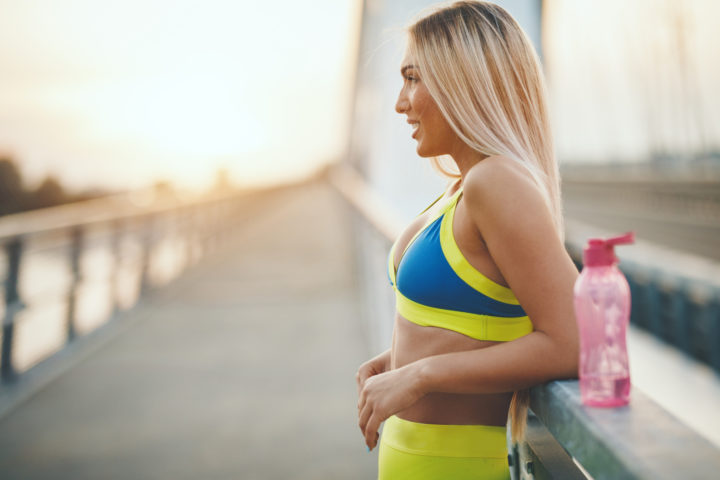
When it comes to selecting pre-workout hydration supplements, it’s crucial to prioritize quality. Opt for reputable brands that undergo rigorous testing for purity, potency, and safety. Look for supplements that are free from unnecessary additives and fillers.
Additionally, consider the form and delivery method of the supplement, such as powders, capsules, or liquids, to ensure it suits your preferences and needs. By choosing high-quality supplements, you can ensure that you’re getting the intended benefits without compromising your health.
Use a Personalized Approach to Hydration Supplementation
Based on variables like activity level, climate, and individual health conditions, different people have different needs for hydration. As a result, it’s crucial to approach hydration supplementation on an individual basis. Pay attention to your body’s signals of electrolyte imbalance or dehydration.
Think about speaking with a medical expert or registered dietitian who can evaluate your unique needs and offer tailored advice. Based on your particular circumstances, they can assist you in choosing the proper supplements and dosage, enabling you to achieve the best possible level of hydration and general health.
Conclusion
In summary, maintaining proper hydration is crucial for overall well-being and performance. Hydration supplements can be valuable tools to support hydration, replenish electrolytes, and provide additional nutrients.
By understanding the benefits of different hydration supplement ingredients, choosing high-quality products, and taking a personalized approach, you can optimize your hydration strategy and support your body’s fluid balance and overall health.
Related Posts:
- Best Pre-Workout Supplements for Obstacle Course Racing
- Upgrade your Attention Span: Best Supplement Ingredients for Focus
- Boost Your Brain Power: Best Nootropic Supplement Ingredients
- Best Supplement Ingredients for Better Muscle Pumps
- The Best “Push Pull Legs” Routines For Building Muscle And Strength
